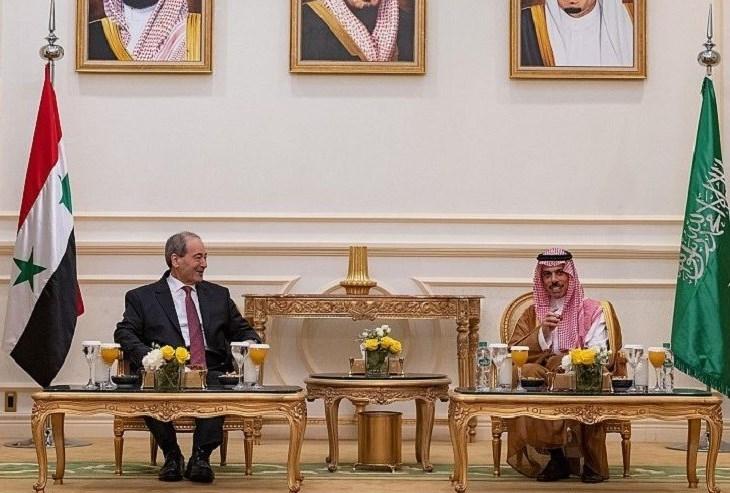For the first time since 2011, Saudi Foreign Minister Faisal bin Farhan visited Syria and talked with the country’s top officials, including Bashar al-Assad. This trip was made after Faisal Moqdad, the Syrian Foreign Minister, had visited Riyadh a week earlier and met with senior Saudi officials.
According to the statement of the Saudi Foreign Ministry, bin Farhan’s visit to Syria was made with the purpose of “examining concerns of the Saudi Kingdom to achieve a political solution to the Syrian crisis and also to provide the required space for Syria’s return to the Arab League.”
The fact is that Saudi Arabia’s effort to normalize bilateral relations with Syria is not unrelated to the recent diplomatic developments in the region, including the improvement of Tehran-Riyadh relations, as well as the “success” of Damascus in curbing the security crisis.
The visit of the head of the Saudi diplomatic service to Syria and the visit of Faisal Moqdad to Riyadh was important.
The existence of some structural variables, regional and international factors, as well as “strategic and geopolitical imperatives” in the foreign policy of the two countries, especially Saudi Arabia, has an influential role in improving the country’s relations with Syria, which can lead to significant “strategic consequences,” the most important of which are as follows:
One; of the most strategic consequence of the peace talks between Saudi Arabia and Syria and, as a result, the restoration of bilateral relations after 12 years is that all the “projects of the West” and hundreds of billions of dollars in material costs to overthrow the political system and carry out structural and operational changes in Syria and isolate the country have failed.
Improving Saudi-Syria relations indicates the futility of the White House’s efforts to convince Washington’s Arab allies and partners to stay away from Syria and restore relations with that country. This is a unique opportunity for the Syrian government to overcome the material and non-material consequences of the civil war in that country.
This issue is also considered a significant achievement for the Islamic Resistance Front, for which Syria is one of the main pillars.
Two; in the meeting with Bashar al-Assad, the Saudi foreign minister clearly emphasized “Saudi Arabia’s all-round support for Syria”; the announcement of such a policy, even in the situation that Riyadh was one of the leading countries in the escalation of the Syrian security crisis in 2011 and after, and until recently was against getting closer to Damascus, is an essential platform for “improving Syria’s political position” among Arab countries and speeding up and facilitating the return of Damascus to the Arab League and achieving a more prominent position in the Arab world than in the years before the crisis.
Three, the “weakening” of the regional role of the US and Europe is the following necessary consequence. The beginning of the process of resuming the relations between Syria and Saudi Arabia, which is partly influenced by the Tehran-Riyadh agreement, is a significant development carried out without the intervention of the United States and precisely opposite to the declared and practical positions of that country. In an unannounced trip to Saudi Arabia and meeting with the Saudi authorities, the head of the CIA, William Burns, expressed his displeasure with Riyadh’s approach to Damascus.
The preparations for the recent talks between Syria and Saudi Arabia have been made in Russia, and Moscow plays a role in advancing the peace talks between the two countries. The resumption of relations with Syria through non-American and non-European channels shows that Crown Prince Mohammed bin Salman, the de facto leader of Saudi Arabia, has no desire to hide his intentions for greater independence from the United States. If this were the case, he would not have put the strategy of strengthening relations with Washington’s enemies, especially Iran, Syria, Russia, and China, on the agenda; such an approach does not have a good message and consequence for the US in the region.
The peace between Saudi Arabia and Syria with the mediation of Russia after that country’s agreement with the Islamic Republic of Iran with the mediation of China shows how far Moscow and Beijing have placed themselves between Washington and Riyadh!
Four, the developments and movements taking place in the region at the diplomatic level and between different countries, including Saudi Arabia and Iran, Syria and Saudi Arabia, Egypt and Syria, the UAE and Turkey, Qatar, and Egypt, are not events that can be underestimated.
What we are witnessing in Damascus-Riyadh relations and before that Saudi Arabia and Iran, Egypt, and Syria, the UAE and Turkey, etc., are of the type of “strategic developments” in which Syria is at the center of it and indicate the return of the process of “politics and power” and “stability and security” in regional dimensions to the years before the start of the Syrian war (2011).
Normalization of Riyadh’s relations with Damascus is a reflection of the revision of regional policies and the adoption of the “pragmatism” approach in Riyadh’s foreign policy, which can play an essential role in maintaining regional stability because Saudi Arabia is one of the critical regional powers that can play an influential role in the creation of regional regulatory mechanisms.
Final point
Improvement of bilateral relations will not fundamentally change the “strategic calculations” of any of the two countries in the short term, so it is unlikely that the security environment governing Riyadh-Damascus relations will change significantly in the short time.
In short, if the situation that started after the Tehran-Riyadh agreement peaked in the Riyadh-Damascus peace talks continues favorably, a new logic will prevail in the region, and a stable, safe, and strong region with minimal interventions from Western countries and the United States will be realized.










0 Comments